On the Birthday of Fryderyk Chopin (1st March 1810) and close to the Second Anniversary of the Outbreak of the Invasion of Ukraine by Russia. Some thoughts on the town of Berdychiv and its legendary association with Fryderyk Chopin
Try and read this remarkable book written by a 12 year-old Ukrainian girl:
 |
| A scene of destruction in Berdychiv, a town 150 kms from Kyiv |
 |
| Irina Maniukina plays her piano amidst her destroyed home in Bila Tserkva, 77 kms south of Kyiv, one last time, before being forced to flee Chopin’s Étude Op. 25, No. 1 (Aeolian Harp) Unmute to listen https://www.youtube.com/watch?v=DDUdK5SYa7w Prior to the bomb explosion outside their house, her daughter Karina said there was no warning; no plane sounds, no air sirens, just an “orange and black” cloud when the blast hit. “After the explosion, everything was smashed and in ashes,” Karina said. “I looked around the house and saw that a fire was starting in my brother’s room. I had already called my mother and they rushed as quickly as possible. They couldn’t drive straight to the house. Since the wires just lay on the road. “They ran into the house and all together ran to put out the fire. After that, everyone breathed a sigh of relief, and my mother decided to gather her thoughts and sit down at the piano.” Words fail me ... tears fall ... no comment possible on the reverse of the coin of human creativity ... |
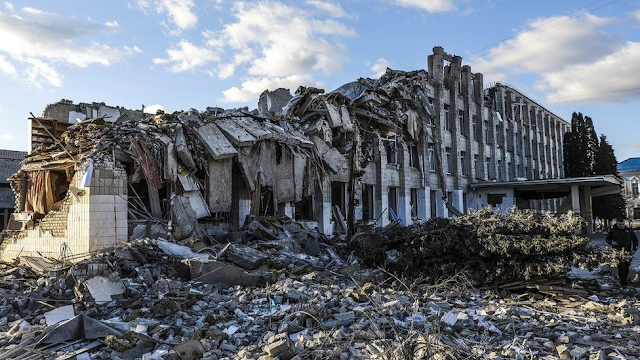 |
| Since the invasion began, much of Zhytomyr's key infrastructure - including this school building - has been destroyed |
The Ukrainian town of Berdychiv is 44 km (27 miles) south-west of the oblast capital, Zhytomyr (which has been under fierce, murderous and destructive Russian military attack) which itself is around 140 kms west of Kyiv.
In some Ukrainian sources there is an apocryphal 'legend' that Fryderyk Chopin was in Berdychiv in the 1820s as a young man. At the time there was a sizable Polish minority resident there as well as being predominantly Jewish. In 1797, Prince Radziwiłł, with whom Chopin is alleged to have stayed, (a member of this large family was owner of the town), granted seven Jewish cloth merchants the monopoly of the cloth trade in Berdychiv. In the first half of the 19th century the town's commerce was concentrated in Jewish hands. They founded scores of trading companies and banking establishments there, with agencies in the Russian interior and even abroad.
Chopin was already a keen and brilliant improvisatory organist at the Visitationist Church (Kościół Wizytek) in Warsaw. As we know, he was already a renowned young pianist and composer of genius. According to the legend, Chopin supervised the installation of the original pipe organ at the St. Barbara church in Berdychiv, although this is not proven with documentation. This church organ, which the Chopin possibly played so well, was unfortunately destroyed by the Communists in the 20th century. How did such a legend arise? Lost in the mists of time.
Authentic fame was brought to Berdychiv's main Catholic church by the celebrated marriage in 1850 of the French author Honoré de Balzac to his Polish aristocratic bride and landowner in Ukraine, Countess Ewelina Hańska. A quite extraordinary story worthy of another post!
Subsequently, the greatest Anglo-Polish writer, Joseph Conrad, was born Teodor Józef Konrad Korzeniowski in Berdychiv on 3 December 1857 and baptized in the basilica. He has accompanied me on my travels and travails all my life. The church was reconsecrated in 1993.
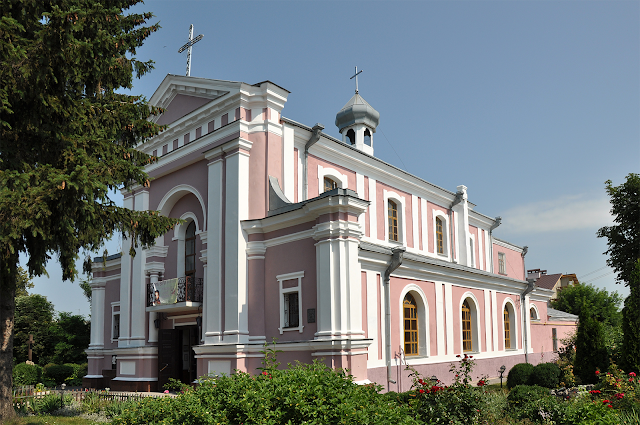 |
| The Roman Catholic Church of St. Barbara, Berdychiv (1759). It was founded in the mid-18th century on the site of an earlier Polish Carmelite Monastery in 1630 |
 |
| Fryderyk Chopin Chopin sketched by Eliza Radziwiłł at Antonin en route to Duszniki Zdrój 1826 |
Being a writer myself and considering Joseph Conrad one of the greatest of English writers, I travelled to Berdychiv in 1992 from my project in Warsaw in search of his birthplace. No-one I spoke to had ever heard of him but now there is an entire museum devoted to the immortal author. I just hope it survives this indiscriminate, barbaric onslaught.
 |
| Joseph Conrad (1857-1924) |
 |
| The Joseph Conrad Museum, Berdychiv |
Only remnants of this rich Jewish heritage remain in the town where another ‘Final Solution’ began its great acceleration in September 1941 with the murder of 30,000 Jews. In 1768 the fortified Catholic monastery was under siege to the Russians. How the cycles of history repeat themselves in the present tragedy, even in reversal. A depressing thought.
The defending Poles, known as the Confederation of Bar, were led by the dashing young cavalry officer General Kazimierz Pułaski (1747–79), dressed in a jacket of elk-skin and braid. He is considered 'the father of the American cavalry'.Although surrendering after two weeks with fifteen hundred defenders, he was a fearless upholder of the heroic Polish battle cry ‘For your freedom and ours!’ Still a source of inspiration. Modern Poles inflamed by vodka in an access of heroic nostalgia continue to shout ‘Na Berdyczów!’ (‘To Berdychiv!’) and thump the table and stamp the floor.
Today some may actually set off for the Ukrainian war. For many generations from the fourteenth century the region with its impregnable castle was owned by the noble Polish Tyszkiewicz family. The great pianists Anton Rubinstein and arguably Vladimir Horowitz were born in Berdychiv, although Horowitz tells us he was actually born in Kiev.
The book The Bones of Berdichev: The Life and Fate of Vasily Grossman, John Garrard and Carol Garrard (New York 1996) is remarkable. It is a passionate account of the rarely chronicled Holocaust in Ukraine.
Life and Fate by Vasily Grossman (London 1985), is one of the great literary masterpieces of the twentieth century. It chronicles the many aspects of life under the Soviet totalitarian regime including the liquidation of the Berdychiv ghetto in September 1941. Suppressed in the Soviet Union for many years, it is a Tolstoyan panorama of what Osip Mandelstam termed the ‘wolfhound century’.
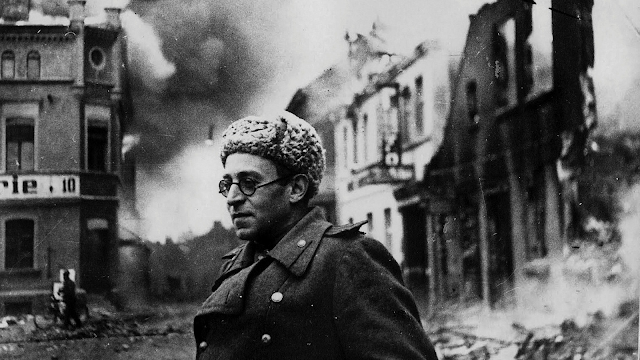 |
| The Russian-Jewish dissident author Vasily Grossman (1934-1964) (FT) |
Much of this history, landscape and the present cruel and barbarous conflagration was coursing through my mind as I listened to the performance of Chopin's compositions which speak so eloquently of suffering and anguish.
The performer Bruce (Xiayou) Liu is the current winner of the great International Chopin Competition 2020, but this, despite his present fame and brilliance, seemed rather irrelevant to me in the midst of the horror on my Polish doorstep. A fine performance certainly, with minor reservations.
I do not feel it appropriate to chronicle this recital critically today. At this terrifying moment, when people are dying in their thousands, interpretation is surely of peripheral interest to the profound spiritual commentary Chopin is making on the fate of so many of humankind in his music. There are numerous great pianists throughout history but only one composer of the universal spiritual stature of Fryderyk Chopin. The soul of his music survives in many ways, no matter how mediocre or brilliant the executant.
The spirit of Chopin is impregnable. Let us not lose sight of the true significance of this composer for music lovers amidst the superficial distractions of trade and performance. Chopin possesses an unrivaled position as Poland’s national composer and its musical wieszcz (bard or prophet). His music remains the beating heart of the country.
The great Polish poet Cyprian Norwid (1821–83) described Chopin as ‘a Varsovian by birth, a Pole by heart, and a citizen of the world by talent’. Virtuoso brilliance, a supreme gift for melody and an air of sentiment explain his immense appeal on a popular level. But more deeply, the universality of Chopin lies in his profound sense of loss and nostalgia. His revolutionary music expresses a fierce resistance to domination, a sense of sacrificial melancholy in the face of the bitter finales of life – universal and timeless human emotions.
The great pianist and statesman Ignacy Jan Paderewski, in an eloquent address given at the Chopin Centenary Festival at L’viv (Lemberg, Lwów) in 1910, said
‘He gave all back to us, mingled with the prayers of broken hearts, the revolt of fettered souls, the pains of slavery, lost freedom’s ache, the cursing of tyrants, the exultant songs of victory.’
Fryderyk Chopin, while ‘detached’ from the Polish revolutionary cabals in nineteenth century Paris, expressed more profoundly than almost anyone, the sorrow and heroic aspirations of the Polish spirit. In doing so he gave voice to the universal suffering of any and all spirits labouring under a totalitarian heel or shackled by personal psychological chains. His music offers deep consolation to troubled and tormented hearts throughout the world. The music of Chopin continues to express the beauty and richness of our conscious life, forever overshadowed by the implacable reality of brutality, death and evil, a profound awareness of which is surely the source of all we would wish to call ‘civilization’.
As I listened to this great, by turns, revolutionary and melancholic statement, fierce anger, nostalgia for past joys, the anguish of loss and pleas for freedom, I could not help reflecting how the expression of the powerful spirit of resistance in much of Chopin is so desperately needed today. This not only in the national Polish spirit he envisioned but with the powerful arm of his universality of soul. We are confronted throughout the world by incomprehensible onslaughts of evil, barbarism, the self-serving politics of the golden calf and now two profoundly tragic, plague-ridden and murderous, blood-lusting war. We need Chopin, his heart and spiritual force in 2024, possibly more than ever.
One must never forget that in 1830, partitioned Poland did not exist as a sovereign nation state on European maps. The sector around Warsaw was referred to as 'Congress Poland' or 'Russian Poland', nominally and more formally as the 'Kingdom of Poland'. Effectively the country remained a phantom presence in the mind of its inhabitants under Hapsburg, Russian or Prussian domination, effectively 'partitioned', until regaining independence in 1918. The concept of a 'sovereign nation' and 'freedom' has cavernous significance for Poles and Poland. Hence their deep identification with the Russian threat to the sovereignty of Ukraine.
The moody Grand Duke Konstantin Pavlovich, commander-in-chief and de facto viceroy of Tsar Alexander I to the Kingdom of Poland, often asked the Wunderkind to play for him to ‘soothe a savage breast’. 'Szopin' was collected in a sleigh from his home in the Saxon Palace and drawn through Warsaw streets by four horses harnessed abreast in the spectacular Russian manner and taken to the Belvedere Palace. From his earliest years Chopin was exposed to the refinement and ease in the highest echelons of society. This remarkable social milieu formed both his cultivated temperament and musical tastes.
At Stuttgart, in his album written before 16th September 1831, he reflects on the imagined horrors of the November Uprising, of being a dying man, being a corpse with many lugubrious reflections on having left his country, his family, his love and friends to further his musical career.
'I know how you love me [referring to his family] She [Konstancja Gładkowska] only pretended - or she is pretending - Oh that is a problem to be solved ! - She does, she doesn't, she does, she doesn't, she does, hand to hand...all fall down! Does she love me? Does she love me for sure? - Let her do what she wants. Today I have a higher feeling, higher, I have a feeling far higher than curiosity in my soul.
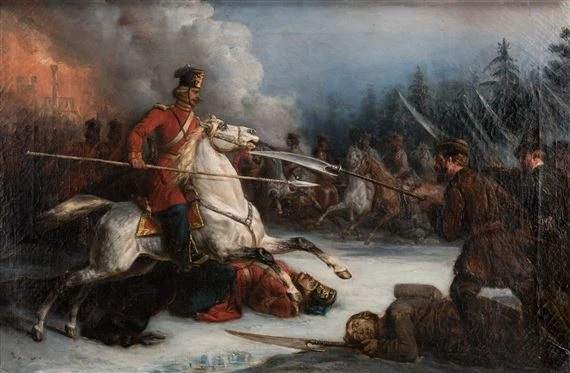 |
| November Uprising 1830-31 against the Russian hegemony by Janvier Suchodolski |
After 16th September 1831, again from Stuttgart, we have a desperately fractured journal entry that possibly chronicles the inspiration of the composition of the 'Revolutionary' Étude in C minor, Op. 10 No 12 which I felt should be performed this 1st March with other expressive and rebellious works such as the Fantasy in F minor. The entire Liu concert was dedicated to the magnificently courageous defenders of Ukraine.
'What is happening with her? - Where is she? - Poor thing! - Perhaps she is in the hands of the Muscovite! - The Musovite pushes her - strangles - murders, kills her! - Oh my Life, I am here alone - come to me - I'll dry your tears, I'll heal the wounds of the present - recalling the past to you.[...] I'm not Grabowski [Gładkowska married Józef Grabowski in January 1832]
By September 1831 the Kingdom had once again fallen under the Russian yoke and a distraught Chopin wrote in his Stuttgart diary in painful, dislocated sentences
The suburbs in ruins – burnt down – Jaś – Wiluś no doubt died on the ramparts – I see that Marcel has been imprisoned – Oh God, have You not had enough of Moscow’s crimes – or – or – You are a Moscovite yourself! . . . sometimes I only groan and express my pain on the piano – I am in despair . . .
* * * * * * * * * *
However, three works on Bruce (Xiaoyu) Liu's programme in Warsaw in 2022 seemed utterly appropriate and moved me emotionally in the tragic circumstances in which humanity finds itself. The playing was as brilliant and varied as one might expect of the winner of the International Chopin Piano Competition.
Nocturne in C sharp minor Op. 27 No. 1 (1835)
Liu opened his performance of the work with tenderness, an affecting rather dark expressiveness and the untranslatable Polish emotion of żal.
A Lepizig reviewer in the Allgemeine Musikalische Zeitung wrote of this nocturne in 1836 so appropriately for our particular time
This is a dream - a dream that becomes a dance of longing. He chooses sadness because he cannot find the joy he loves.
Ballade in F major Op.38 (1839)
Penetrating the expressive core of the Chopin Ballades requires an understanding of the influence of a generalized view of the literary, musical and operatic balladic genres of the time. In the structure there are parallels with sonata form but Chopin basically invented entirely new musical material, nothing less than a new genre. I have always felt it helpful to consider the Chopin Ballades as miniature operas being played out in absolute music, forever exercising one's musical imagination. 'I merely indicate. The listener must complete the picture' Chopin observed to his pupil von Lenz.
Chopin worked on the F major Ballade in Majorca. In January 1839, after his Pleyel pianino had arrived from Paris, he wrote to Fontana ‘You’ll soon receive the Preludes and the Ballade’. And a few days after, when sending the manuscript of the Preludes: ‘In a couple of weeks, you’ll receive the Ballade, Polonaises and Scherzo.' So the conception took place in the atmosphere of a haunted monastery, threatened by untamed nature, the same ambiance as the Preludes. Here was conceived the idea of contrasting a gentle and melodic siciliana with a demonic presto con fuoco – the music of those ‘impassioned episodes’, as Schumann referred to them.
In the opinion of the musicologist and Chopinist Jim Samson, the work coalesces into an entire organic expression, a Romantic 'fragment of autobiography' if you will. Sometimes Chopin would perform the childlike innocence of the opening lyrical siciliana as a separate work and not continue to the volcanic, explosive and almost terrifyingly passionate presto con fuoco.
The driving desperation before the exhausted resignation of the close is deeply affecting just now. The Ballade Op. 38 is a true 'narrative of national martyrdom'. [Professor Johnathan D. Bellman]
Sonata in B flat minor Op. 35 (1840)
Liu gave me rather mixed feelings overall in his performance. Tempo and dynamics needed far more subtlety and expressiveness to penetrate the profound soul of this composition. Surely no work is more relevant to the present cauldron of suffering.
The Marche funèbre is such a shocking jolt by the force of destiny. The reflective trio of the Marche is a gloriously nostalgic contrast of innocence, love and purity blighted by the ugly reality of death (Chopin was terrified of being buried alive – often horrifyingly possible in those primitive medical times). The great Polish musicologist Mieczysław Tomaszewski continues perceptively:
‘The Sonata was written in the atmosphere of a passion newly manifest, but frozen by the threat of death.’
A deep existential dilemma for Chopin speaks from these pages written in Nohant in 1839.
The pianist, like all of us, must go one dimension deeper to plumb the terrifying abyss this sonata opens at our feet, especially now. Of the Presto which concludes the work, Chopin wrote characteristically with intentional irony of the ‘chattering after the march’ leaving Schumann to write in philosophical and literary frustration: ‘The Sonata ends as it began, with a riddle, like a Sphinx – with a mocking smile on its lips’.
Such an existential riddle confronts us now, even the mocking smile on the lips of the perpetrator.
One is forced to ask 'Can music civilize mankind?' And the answer ?
Truth is the gravest moral quality now under threat.
The audience gave Liu a massive and highly enthusiastic standing ovation.
Three encores followed : An affecting interpretation of the Nocturne in C minor, three carefree Ecossaises and the miniature early dolente posthumous Waltz in A minor. He told us it was the first piece Chopin played as a ten year old child and dedicated it to the Ukrainian children caught up in this terrible war.
* * * * * * * * * *
My detailed review of his competition recording:
http://www.michael-moran.com/2022/02/review-of-national-chopin-institute-cd.html
Detailed review of many of his performances in the 2020 International Chopin Competition:
http://www.michael-moran.com/2021/09/xviii-international-chopin-competition.html
* * * * * * * * * *
On this birthday review of Chopin, I unapologetically include a moving link concerning the Ukrainian refugee crisis, even if it possibly seems bizarre in a concert review. It is profoundly appropriate to draw your attention to it and remember.
Never forget an example of impulsive selflessness and courageous generosity on the part of Paddy Ney, a British born, now Polish national, who is a writer, film-maker and journalist.
 |
| Patrick Ney (far right), a British-born Polish national said he has been taking refugees of many nations into his home. Others around the country are still doing the same. |
https://fox29.com/news/polish-man-opens-home-to-ukrainians-seeking-refuge-from-war-torn-homeland
and on Twitter
https://twitter.com/gbnews/status/1499437046846349312?s=24
Please share this story and review .....
* * * * * * * * * *
You have no time to say Ooo Ooo
Before the Brown Bear sits on you
A Russian aphorism.
The historical context of this conflict is vital to understanding the present
* * * * * * * * * *
To properly appreciate the miraculous sea change in attitudes that has taken place in the fraught history of relations between Poles and Ukrainians between WW II and today - the manifest Polish selflessness being expressed now in their overwhelming generosity of spirit - please read
Bloodlands : Europe between Hitler and Stalin by Timothy Snyder (Basic Books 2010).
Nothing is True and Everything is Possible: Adventures in Modern Russia Peter Pomerantsev
Indispensable also The Road to Unfreedom by Timothy Snyder (London 2018)
A remarkable book written by a 12 year-old Ukrainian girl
You Don't Know What War Is: The diary of a young girl from Ukraine by Yeva Skalietska (London 2022)
* * * * * * * * * *
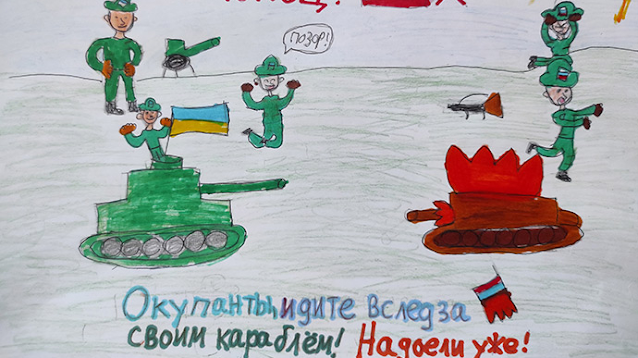



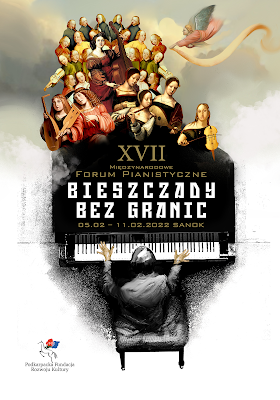

Comments
Post a Comment